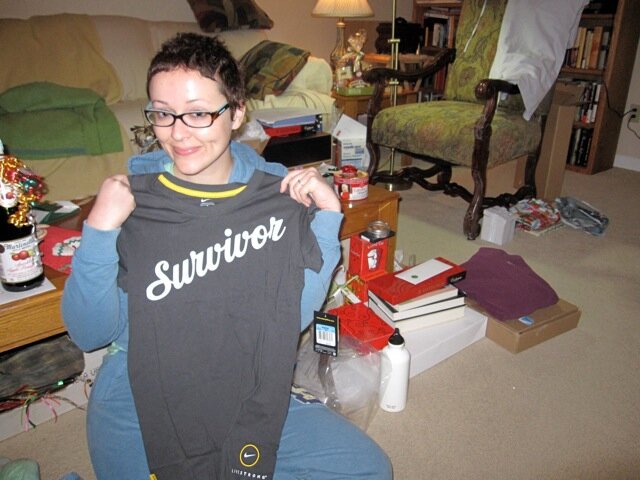Can you be a survivor when you are living with cancer?
PHOTO: Me getting this shirt on Christmas.
For Christmas I got two of the same t-shirts: one from Brett and the other from Alicia and Gabe.
I like the shirt(s) for multiple reasons.
It is designed well.
I like gray shirts.
Gray is the official color for brain tumor awareness.
I always complain about not looking cancer-y enough and this shirt screams "CANCER!" (I know, punch me.)
I am not sure when it is appropriate to wear the shirt. Working out? Running errands? Walking a 5k? Who knows.
When I wear it I feel a bit self-conscious. I feel like I have a t-shirt on that says, "I have (or had) cancer." Why do I feel that way? Because the shirt is saying that.
But I am conflicted.
Am I survivor? Before I was aware I had cancer I thought "survivors" were people who were cancer-free. And knowing that I don't want to walk around with people thinking I am all better now. Because I am not cancer free.
However, now that I have cancer my perception has changed. I think people are survivors the moment they get diagnosed. They are survivors until they die.
But what about people who die? I guess that means they are no longer survivors. That sucks--if you die from cancer you shouldn't be labeled a "non-survivor".
Some marketing genius needs to come up with a new term for people who are currently in the fight. I want merchandise that says "warrior". Doesn't that make more sense? Warrior puts an image in your mind of a person who is battling it out. And if you die, you are still a warrior--a warrior who went out fighting.
Update from 2020 looking back: I am no longer a fan of the “war metaphor” for cancer. I don’t like anything about it, and have donated all of these t-shirts to Goodwill.
